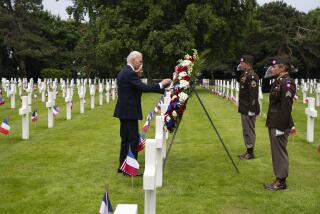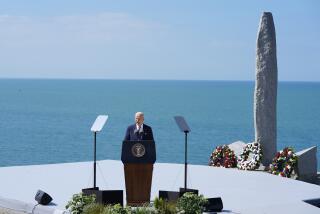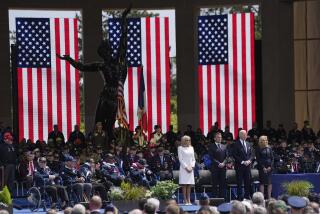PERSPECTIVES ON D-DAY : War’s Worst Risk Is to the Soul : The memorials always omit the full measure of our debt--turning men into warriors who killed in our name.
- Share via
The season of war ceremonies has only begun with the President’s visit to the American cemetery outside Rome and the memorial at Omaha Beach. With the 50th anniversaries of V-E Day and V-J Day approaching, war observances will intensify. These parades, concerts and unveilings are much appreciated by those who served our nation in uniform. They’re a welcome contrast to the immediate post-Vietnam era. However, in an important sense, they are incomplete.
These ceremonies focus on the sacrifices of those who fought. The speeches and writings praise those who risked their lives and, especially, those who gave their lives for their country. There’s nothing wrong with this. Quite the contrary, it’s entirely honorable and proper to praise the sacrifice of others. But war is more than sacrifice. War is more than exposing your body to injury and your future to death. Warriors do more than put their bodies at risk. Warriors kill. Killing is the essence of war. When we, as a nation, send our sons to battle, we ask more than sacrifice. We want victory. We arm our warriors with knife and gun, with bayonet and bomb, then tell them to win. We order them to kill. In our name.
As horrific as killing is, it isn’t even the worst of war. The full measure of war is cruel to the spirit. Warriors must do more than kill. To succeed on the battlefield, the warrior must aggressively search out the enemy, kill that man and pursue his next victim. He must bare his soul and attack. When attacking, warriors must want to kill. This is the personal horror of war. Sports columnists and coaches blithely refer to the “killer instinct.” On the battlefield, this instinct is very real. Absent this instinct, the warrior comes home either very lucky or very dead. Worst of all, he may come home defeated.
When Joshua Chamberlain led the 20th Maine’s bayonet charge down Little Round Top, his men had to bare their souls. Their heads may have convinced them to fight for a cause; their hearts may have told them to fight for their buddies. But how does a man want to run a bayonet through the face, the gut of a fellow man? How do you shoot another human in the face, then aggressively move on to your next victim? Marines at Tarawa, airmen over Germany and submariners with enemy troop ships in their sights faced the same challenge. Each made the same decision. Because of their acts we have victories to celebrate, not defeats to rue.
This desire to kill is foreign to everything we’re taught. Our Declaration of Independence says that “all men are created equal, that they are endowed by their Creator with certain inalienable rights, that among these are life, liberty, and the pursuit of happiness.” The Commandments state, “Thou shalt not kill.” The best of us believe these words. But warriors put these words aside. They suppress the words in order to aggressively seek out and destroy another man’s life.
However, when the fight is over, the words return. “Thou shalt not kill.” When the fight is over, the images and sounds of battle return and never go away. Blood spurting; a burning town; cries for help; the full impact of what you’ve done--and the full realization that you wanted to do it. It’s at that point, and forever after, the nation must pay its debt to the warrior. The nation must tell the warrior that his actions were right and just and honorable. Having done his nation’s bidding, the warrior must not face his soul alone. The nation must stand beside its killers, because the nation, not the warrior, created them.
Our nation well honors its veterans for risking life and limb. However, we seldom praises veterans for risking their souls. The speeches and memorials rarely mention the full toll of war. That is a shame. When the nation fails to comfort those who killed in its name, it leaves those warriors to face their souls alone. That is too much for a great and caring America to ask.
More to Read
Go beyond the scoreboard
Get the latest on L.A.'s teams in the daily Sports Report newsletter.
You may occasionally receive promotional content from the Los Angeles Times.










